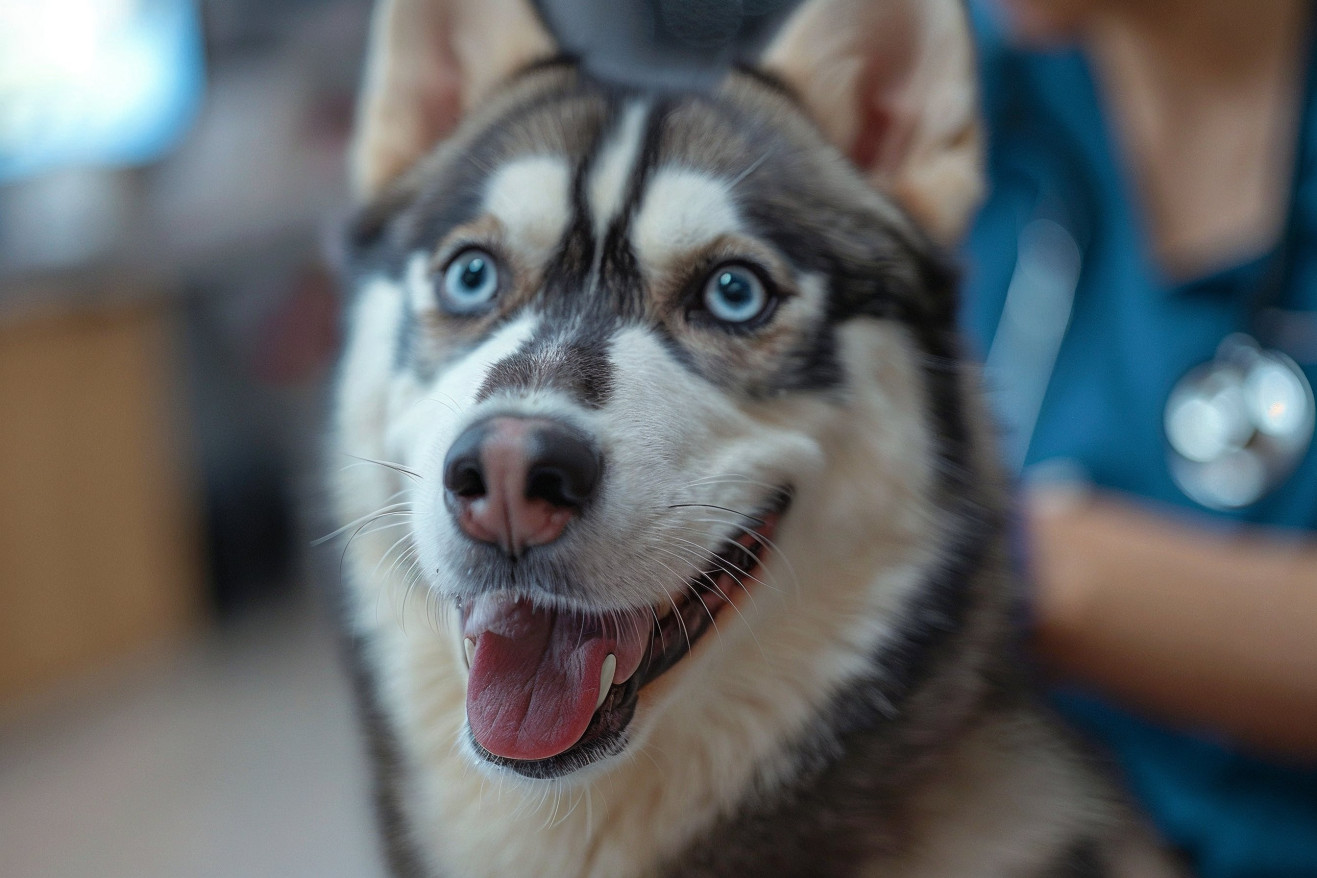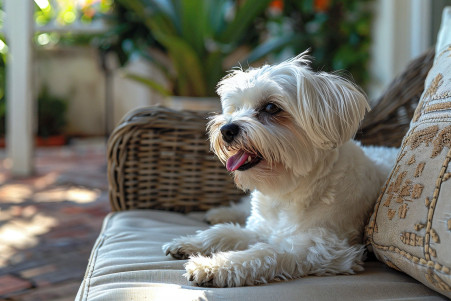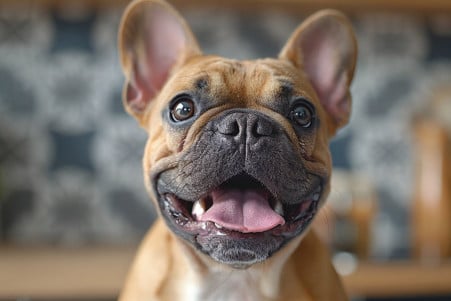Why Is My Dog Licking Lips a Lot? Decoding Canine Behavior
16 March 2024 • Updated 15 March 2024

While it may be easy to dismiss your dog’s frequent lip licking as a quirky habit, there are a number of reasons why your dog may be licking their lips more than usual. In addition to stress and anxiety, other causes of excessive lip licking in dogs include nausea, dental problems, and pain.
It may also be the result of allergies or skin issues. If your dog is licking their lips a lot and you notice other symptoms, it’s important to see a vet to get a proper diagnosis.
In order to better understand why dogs lick their lips so much, we will draw on a number of scientific fields, including veterinary science, animal behavior, and psychology. By examining academic research, collecting information from veterinarians, and looking at behavior, we hope to create a well-rounded view of this dog behavior. This interdisciplinary approach will help you better understand what’s driving your dog’s lip licking and how you can best address it.
Why is my dog licking lips a lot?
What Does It Mean When a Dog Licks Their Lips Too Much?
While lip licking is a normal behavior in dogs, it can indicate a problem when it happens too often. Dogs lick their lips when they’re hungry, when they’re expecting food, and as a sign of submission.
However, if your dog is licking their lips all the time, it’s considered excessive. According to PetsBest, excessive lip licking can be defined as lip licking that causes physical irritation or disrupts the dog’s normal activities, like eating, sleeping, or playing.
According to PetMD, other signs that your dog’s lip licking is excessive include skin irritation, sores, and even hair loss. These are signs that your dog’s lip licking has become more than a quirky habit and could be a sign of an underlying health issue.
To determine if your dog’s lip licking is a problem, pay attention to how often they do it, how long they do it, what’s happening when they do it, and any other behaviors that happen at the same time.
If you pay attention to these patterns, you’ll be able to tell if your dog’s lip licking is a harmless habit or a sign of a health problem that needs to be addressed by a vet. Knowing these signs and what they mean will help you know when to seek professional help and make sure your dog is healthy.
What Causes Dogs to Lick Their Lips Excessively?
The causes of excessive lip licking in dogs can be broken down into two categories: behavioral and medical. On the behavioral side, In her book, dog behaviorist Turid Rugaas explains that dogs often display lip licking as a calming signal when they feel stressed or are trying to appease a perceived threat.
Psychological issues, such as anxiety or fear of other dogs or strangers, can cause dogs to lick their lips more often in social situations.
On the medical side, Veterinarians like Dr. Michelle Diener identify health issues that may manifest as excessive lip licking. Conditions such as dental disease, nausea, acid reflux, and neurological disorders can lead to oral discomfort, which is often associated with excessive lip licking.
Veterinarian Samantha Coe, BVetMed, points out that if you notice a decrease in appetite or vomiting, especially when combined with lip licking, it could be a sign of an underlying health issue.
It is important to determine whether the cause of the excessive lip licking is behavioral or medical, as this will determine the appropriate course of action. Paying close attention to the dog’s other symptoms and the context in which the lip licking occurs can help you determine the cause.
If the lip licking does not seem to be related to behavioral issues or if it continues even when the dog is no longer in a stressful situation, it is important to consult a veterinarian to rule out medical issues and determine the best course of action.
Investigating Medical Concerns: Why Is My Dog Licking Their Lips So Much?
There are several medical concerns, many of which will require the help of a veterinarian, that could be causing your dog to lick their lips excessively. One of the most common is oral health issues. Severe gingivitis, cavities, and oral tumors can all cause pain and, in turn, lip licking, according to the Merck Veterinary Manual. Gastrointestinal problems, including nausea and bloat, can also cause this behavior, says Dr. Julie Buzby.
Don’t discount the possibility of neurological problems. For example, some dogs have been known to lick their lips before or after a seizure. A veterinarian will work to find the cause of the issue, which will often involve a physical exam and may also involve bloodwork, imaging, or an oral exam. Treatment will depend on the cause and may involve anything from dental work to medication to dietary changes.
If your dog is licking their lips excessively, it’s not just a matter of understanding your dog’s behavior. It’s a sign that you should be looking into your dog’s health and considering the possibility of a medical issue. By talking to a vet, you can make sure that you catch any issues early and that your dog gets the best care possible, which will ultimately help them live their best life.
Canine Lip Licking: Does Diet Matter?
Looking into the dietary causes of excessive lip licking in dogs, it becomes clear that the relationship between what a dog eats and how often they lick their lips is complex. Studies have shown that diet can have a significant impact on dog behavior.
For example, certain dietary factors, including protein and the amino acids it contains, can affect neurotransmitter synthesis, which in turn can impact stress resilience and aggression. In addition, polyunsaturated fatty acids, which are important for brain health, may also impact dog behavior.
The composition of a dog’s diet can also impact their oral health, which can, in turn, impact how often they lick their lips. For example, a study by Neşe Kocabağlı et al. found that diets that are primarily composed of dry food can help lower the risk of periodontal disease, which, if not treated, could lead to excessive lip licking as a result of discomfort.
Therapeutic nutrition may be able to help dogs with stress-related behavioral issues. The Purina Institute notes that probiotics and specific nutritional interventions may be able to impact the gut-brain axis, potentially leading to a reduction in anxiety and anxiety-related behaviors, including lip licking.
As a whole, this research suggests that paying close attention to a dog’s diet and ensuring that they get specific nutrients could help improve their oral health and the impact of stress-related behaviors, potentially lowering the frequency of excessive lip licking. Dog owners may want to talk to a veterinarian or a dog nutritionist to see if there are dietary changes that could help their pets feel better.
The Psychological Significance of Dog Lip Licking
In order to treat excessive lip licking in dogs, it is important to understand the psychological causes of the behavior. A study from ScienceDirect explains that dog owners are more likely to notice physical signs of stress in their pets, with shaking and whining being the most common signs. However, more subtle signs like lip licking can be missed, which can lead to even more stress.
Another article from Scientific Reports explains that stress can be linked to changes in behavioral laterality, which means that dogs who are stressed are more likely to have weaker paw preferences, which could be a sign of chronic stress. This shows that a dog’s mental state has a direct impact on their behavior.
Of course, environmental stressors can also cause these behaviors. Anything from a change in living situation to a new social situation to a change in routine can cause stress, which can then lead to lip licking. Ways to manage these stressors can include creating a stable environment, keeping a consistent routine, using desensitization, and creating positive associations through reward-based training.
It’s important to understand that your dog’s mental state is reflected in these behaviors, and that’s why it’s important to understand what’s causing them. By recognizing and managing stressors, you can help your dog feel more secure and balanced, which can then lead to a reduction in stress-induced behaviors like excessive lip licking.
This will help you and your dog build a better relationship and will also help your dog feel more comfortable and secure in their environment, which will lead to a more harmonious household.
Dealing With External Triggers: How to Create a Dog-Safe Space
Dogs are products of their environment, and their behavior often reflects their surroundings. A study in Scientific Reports even found that higher temperatures and increased ozone levels can lead to more dog aggression, proving that dogs are susceptible to environmental stressors. These environmental factors, which can include everything from extreme weather to a lack of socialization, can lead to or worsen behaviors like excessive lip licking.
A study in PMC by Emma Hakanen even found that a dog’s early social environment is important, and that a lack of socialization in puppyhood can lead to personality traits that include higher levels of insecurity and a propensity for stress-induced behaviors like repetitive lip licking.
Creating a safe and secure environment for dogs means taking steps to prevent things like temperature fluctuations in the home, making sure dogs have enough social interaction, and creating a home environment that’s conducive to lower stress and anxiety. By limiting negative environmental factors, we can help our dogs live more fulfilled, balanced lives and in turn, reduce stress-induced behaviors like excessive lip licking.


